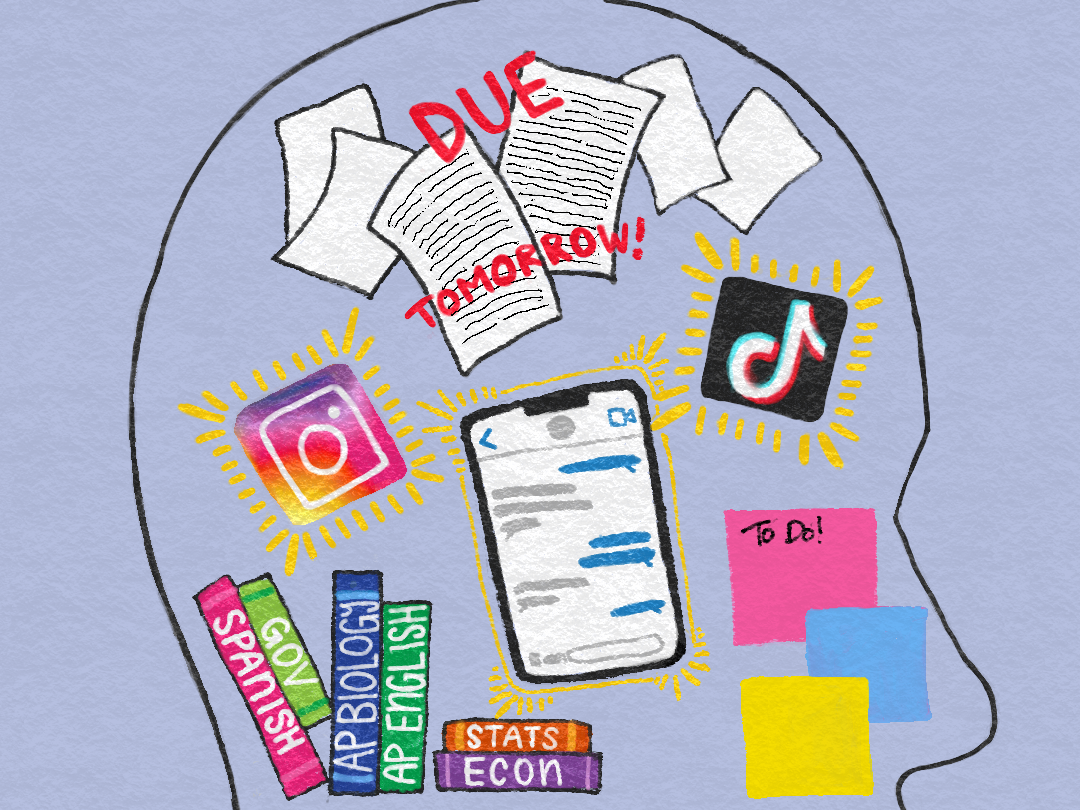Procrastination is a dangerous thing. Putting off tasks that we don’t enjoy is common, despite the consequences that come with it. Procrastination is a challenge we have all faced as high school students, whether that be putting off assignments or not even wanting to come to class: it’s a slippery slope. As semester one has ended and the stress of semester two is approaching, now is the time to leave old procrastination habits behind. To be fair, procrastination is a habit that may never disappear, but there are so many tools to help decrease it.
At times while procrastinating, there are the hours spent re-reading emails and checking social media, the excessive “preparation,” the coffee and snack breaks, and the time spent on other tasks that could have easily been left for later. Procrastination usually involves ignoring an unpleasant, but likely more important task, in favor of one that is more enjoyable or easier. Isabella Smith, senior at Franklin High School says, “I usually procrastinate on homework, housework, working out, almost everything I do. A lot of the time, I procrastinate because I feel uncomfortable and unmotivated to do different tasks.” But giving in to this impulse can have serious consequences. Even minor episodes of procrastination can make us feel guilty or ashamed. It can lead to reduced productivity and cause us to miss out on achieving our goals.
There may be some instances where you might be putting off a task because you’ve had to re-prioritize your workload. If you’re briefly delaying an important task for a genuinely good reason, then you aren’t necessarily procrastinating. However, if you start to put things off indefinitely, or switch focus because you want to avoid doing something, then you probably are.You may also be procrastinating if you: fill your day with low-priority tasks, or leave an item on your to-do list for a long time. Or if you’re like me, always waiting for the “right mood” or the “right time” to tackle or start a task.
Understanding the reasons why we procrastinate is vital and must be done. Are you avoiding a particular task because you find it boring or unpleasant? Take steps to get unpleasant tasks out of the way quickly, so that you can focus on the aspects of your task that you find more enjoyable.
Here are some ways to help decrease procrastination:
Commit to the task at hand:
Focus on doing and completing it, NOT avoiding it. Write down the tasks that you need to complete, and specify a time for doing them. Maybe get other tasks or work out of sight so you can completely focus on what’s right in front of you. This will most likely help you to proactively tackle your work.
Promise yourself a reward:
If you complete a difficult task on time, reward yourself with a treat, such as candy, a phone break, or even making fun plans with friends or family. Make sure you notice how good it feels to finish things up.
Act as you go:
Tackle tasks as soon as they arise, rather than letting them build up over another day. For example, completing or starting homework the day it’s assigned, not when it’s almost due or was already due.
Minimize distractions:
Turn off or silence your phone or put it someplace out of reach, and avoid sitting anywhere distracting. “I try to get rid of all distractions, sometimes I’ll find YouTube videos that make me feel more motivated [before I start studying],” says Smith.
Keep a To-Do List:
This will prevent you from “conveniently” forgetting about those unpleasant or overwhelming tasks. Also prioritize your to-do list; this will enable you to quickly identify the activities that you should focus on, as well as the ones you can ignore.
Tackle the hardest tasks at your peak times:
Do you do your work better in the morning or the afternoon? Identify when you’re most effective, and do the tasks that you find most difficult at these times. This may also include making sure you are prepared to focus, like eating a meal before or staying hydrated. Marlee Dorn, a senior at Franklin says, “I manage schoolwork by making sure I am not working on an empty stomach and that I always have some food with me.”
Set yourself time-bound goals:
Setting specific deadlines to complete tasks will keep you on track to achieve your goals, and will mean that you have no time for procrastination!
Hopefully these tools can put your procrastination habits into perspective and help you create your own methods for tackling them, whether they surface with studying, housework or any other task. Stopping procrastination is easier said than done, but can overall improve stress, anxiety and so much more.


































